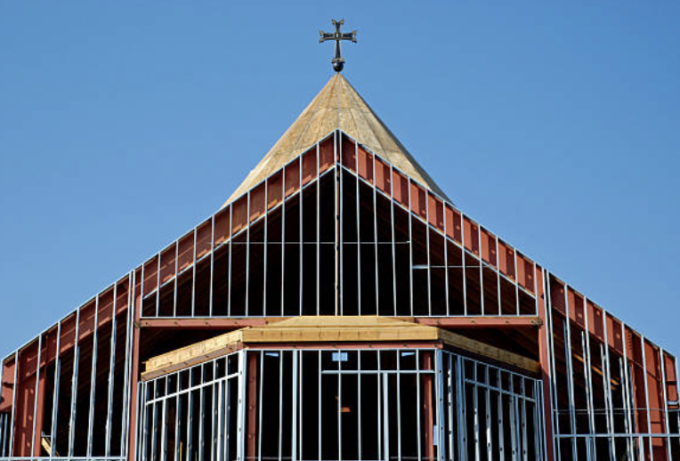
Your Church Building Project by Dr. Gary G. Hoag

Biblical Advice for Your Church Building Project
Want biblical advice for your next church building project that works around the world?
Read this post or share it with anyone you know looking to launch a church building project. I aim to show how common practices that may work don’t align with our Christian faith and offer an alternative biblical example that works worldwide.
Common Advice on Church Building Projects
A friend called me recently. He was appointed to a committee to help with his church building campaign, yet he was disappointed with their language and line of thinking. The so-called “stewardship” committee kept using two common terms over and over which did not sit well with him. I concur. The terms churches do well to avoid are pledges and debt.
Why avoid pledges? They tend to link to future income, and “acceptable giving” is based on what we have not what we don’t have (see 2 Corinthians 8:12). Also, when seeking pledges, churches invite people to make assumptions about the future, which Solomon described as foolish (see Ecclesiastes 10:13-15). God accepts willing giving from what we have now.
And why avoid debt? When a church takes on debt, it chooses slavery (see Proverbs 22:7). This decision limits the ability of the congregation to respond to opportunities around them. And sometimes, those who incur the debt move and leave it like a ball and chain for others to pay off. See how pledges and debt don’t fit with our faith? But is there another way?
Biblical Example for Modern Application – Exodus 25-36
Read Exodus 25-36. This Scripture has many details related to the structure, materials, and contents for the Tabernacle building effort, much like a modern church project. It includes the “golden calf” scene that shows the human tendency to worship the gifts of God instead of God. For this blog post, I want us to focus on two things and revisit the calf later.
1. God’s servant invites people to give willingly from the assets and skills in their stewardship.
The Lord tells Moses to have the people bring an offering. His job was to receive the offering “from everyone whose heart prompts them to give” (see Exodus 25:1-2). He lists the various items needed, ranging from gold, silver, and bronze to a wide array of materials (see Exodus 25:1-9). So, we see Moses giving directions and receiving willing gifts of current assets.
Also, as the tabernacle campaign unfolds, we watch Bezalel, Oholiab, and other skilled workers bring their giftedness to the effort to take the materials and make something beautiful with them (see Exodus 31:1-6). God declares, “I have given the ability to all the skilled workers to make everything I have commanded you.” They have skills and sufficient supplies.
2. God supplies more than enough to complete the work when the people give willingly.
As the project rolls on, we hear this message: “So all the skilled workers who were doing all the work on the sanctuary left what they were doing and said to Moses, “The people are bringing more than enough for doing the work the Lord commanded to be done” (Exodus 36:4-5). So, Moses restrained the people from bringing more. God supplied enough.
Notice the application for today. A pastor gets a vision from God. He tells the people what is needed and shows them how they can participate with what they have. This requires faith on the part of the pastor and faith on the part of the people. And the willing surrender of our assets communicates to God that we trust Him to sustain us in the future.
This biblical example stands in contrast to using pledges and debt, which bring harsh consequences and do not require any faith or sacrifice in the present. Ironically, the common advice draws me back to the golden calf scene. “Then the Lord said to Moses, “Go down, because your people, whom you brought up out of Egypt, have become corrupt” (Exodus 32:7).
Concluding Thoughts
In the middle of the successful tabernacle campaign, the people had become corrupt, or literally “corrupted themselves” by choosing the wrong path. We all make wrong turns. Thankfully, God’s Word helps us get back on track and stay there. Instead of calling for pledges and relying on debt, two practices that may get the job done but which don’t find biblical support, try another way. Invite people to share their assets and skills willingly and trust God to supply in abundance.
In my work around the world, most churches follow the biblical example. They don’t have access to debt, and, especially in poor settings, they don’t assume anything about the future. Interestingly, the greatest benefit that comes to those who follow the biblical approach globally is bigger than a church building. It’s growth in faith, both for the pastor and the people.
####
Gary G. Hoag, Ph.D., serves as President & CEO of GTP. In obedient service to Jesus Christ, GTP multiplies faithful stewards and mobilizes peer accountability groups (like ECFA in the USA) to build trust and to grow local giving to God’s work.

What is Christian Leadership Alliance?
Christian Leadership Alliance equips and unites leaders to transform the world for Christ. We are the leaders of Christ-centered organizations who are dedicated to faithful stewardship for greater kingdom impact.
Sign up for FREE blog updates.
Upcoming Events
Check back later!




